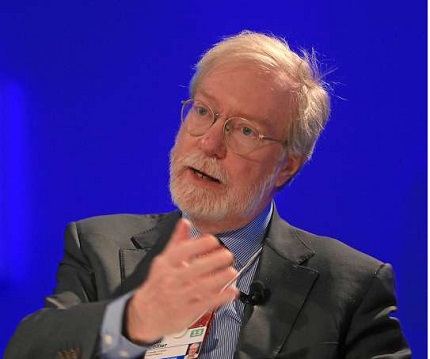Professor Sir Paul Collier, a renowned Economist has advised government to invest the nation’s oil resources into productive infrastructure rather than into consumption.
According to him, current generation of leaders should be able to pioneer and harnessed the country’s oil resources to create a better future for their children.
Professor Collier gave the advice when he spoke at the Speaker’s Breakfast Forum (SBF) at the Parliament House in Accra.
The forum, which was attended by the Leadership of Parliament as well as members was on the topic: “The new opportunities for development in Africa”.
Professor Collier also indicated that though investments in education are very important, however, more attention must be paid on the creation of jobs for the youth.
He said Ghana needs good and selfless leaders to be able to fight corruption in the system.
He said Ghana, being a pioneer in the independent struggle of Africa could set the example for others on the continent to follow.
Professor Collier also charged both the NDC and the NPP to bury their parochial political interest to chart a common path for the future.
Professor Collier further stated that though China was big opportunity for Ghana in the provision of investments for infrastructure for the economy, however, the contracts for the projects must be done in a transparent manner.
He said the Chinese most of the time were after their interest and Ghanaian officials who entered into contract with them must be diligent and look out for Ghana’s interest.
He also advised Ghanaian leaders to scrutinize the contracts they sign with these Chinese companies, which should inure to the benefit of their people.
Mr Joseph Osei-Owusu, the First Deputy Speaker speaking at the forum stated that Africa’s opportunities should be led by the legislative arm of government.
He said though the African continent faced numerous challenges, they had the opportunity, which included the potential to grow and use the resources to get better revenues and used them for the future.
He admitted that trade within Africa was low, however, with the passage of the African Continental Free Trade Agreement, would help trade within the region to grow.
Mr Osei-Owusu also stated that African leaders have currently shown interest to deepen regional trade as it was the surest way to transform the continent and improve the lot of the people.
He said the leadership of the continent must, however, work to complement institutional arrangement with cross-border infrastructure to support the trade initiatives.
He said the Africa was known to hold huge natural resources that held potential for its accelerated development and it was estimated that 70 percent of sub-Saharan export revenue were tied to the proceeds from oil, metals, minerals and natural resources.
Mr Osei-Owusu further stated that the demand for resources was an opportunity for Africa to leverage on for long term investments in infrastructure, agriculture, education, services including banking, financials, IT and Telecommunication and manufacturing.
He said leveraging the infrastructure built by natural resources as part of establishing development corridors for agriculture and others purposes to link the regions and even countries within Africa would be useful.
He said resource revenue management framework for Africa to guide spending and investment by world governments were equally essential, adding that continent would be well positioned to manage the natural resources in a more sustainable manner.







